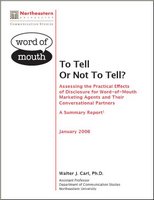 I've had a great response from the blogosphere to my research report on disclosure and organized word-of-mouth marketing programs (see also the AdAge.com article). Some people are surprised by what seem to be counter-intuitive findings in the study, especially in terms of why consumers might not be more skeptical after learning of a person's commercial affiliation through their participation in an organized WOM marketing program. For example, Isaac from the Chapell Associates blog posted this:
I've had a great response from the blogosphere to my research report on disclosure and organized word-of-mouth marketing programs (see also the AdAge.com article). Some people are surprised by what seem to be counter-intuitive findings in the study, especially in terms of why consumers might not be more skeptical after learning of a person's commercial affiliation through their participation in an organized WOM marketing program. For example, Isaac from the Chapell Associates blog posted this:
I must to say I'm surprised by the report's findings. Intuitively, we like to think of recommendations as just someone liking a product and then telling others about it - "here, try this brand of coffee, I really like it," not "here, try this brand of coffee, the company that makes it tells me it's really good." To be totally honest: I can't see why consumers, having been told that someone has a commercial relationship with an advertiser, wouldn't be more skeptical of that person's recommendation.Here's three reasons why I think credibility may be the same or higher when there is disclosure in an organized word-of-mouth marketing program (I presented some of these points in my talk at the WOMMA Basic Training conference on Thursday):
1) In a clear majority of the cases there was an existing personal relationship between the agent (a person participating in the organized WOM marketing program/campaign) and their conversational partner (the person with whom they were talking). In fact, the median length of time the two knew each other was about 6 years. That existing relationship implies a history of conversations about brand-related and non-brand-related topics. In those conversations that aren't related to the organized program the conversational partner builds up trust and credibility in the other person (the agent). Thus, the fact that the person/agent is participating in the program is contextualized by all the other conversations and history of their relationship. That is, in many cases, the conversational partner is likely to feel like it doesn't matter that the person is in the campaign because s/he has my best interests at heart, I know I can trust her/him becasuse of our other interactions, and I know s/he is providing information that would be valuable and relevant to me.
2) A second reason credibility is unaffected, or may even be higher, when disclosure takes place has to do with the fact that the act of disclosing affiliation might be interpreted as a marker of honesty and credibility. That is, the conversational partner hears the disclosure and realizes the person isn't trying to be deceptive or pulling something over on them.
3) Additionally, I don't think many of the conversations play out as the hypothetical scenario you created might indicate. You wrote:
"here, try this brand of coffee, I really like it," versus "here, try this brand of coffee, the company that makes it tells me it's really good."I don't have actual recordings of the interactions but I do have narrative accounts. A more likely scenario might be:
"hey I got some new coffee from company x as part of this campaign I'm in. It's a bit strong for my taste but I think you'd like it."
Part of the point with my admittedly hypothetical scenario (I didn't use an actual excerpt because I wanted to keep it as close as possible to your example for illustration purposes) is that, while people do receive information about the product from the company, they also try it out for themselves and then tell others what they think about it. Thus, the participants are spreading WOM based on their own experience with the brand, product, or service not (just) what the company said.
Thanks for the comment Isaac!
Disclosure is a crucial topic in the word-of-mouth marketing industry so please pass-along the link to download the study to anyone who might be interested in reading the report. Let's keep the discussion going!
---

This work is licensed under a Creative Commons License.
Tags: WOM word of mouth Word-of-Mouth Marketing buzz marketing disclosure





|